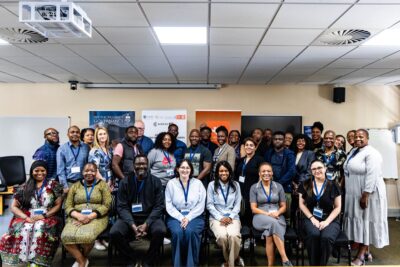“People think that we’re lucky, because we have a roof over our head, room to safely rest, food to fill our tummy, water to clean our body. So, we’re being overlooked. This pandemic came as a ‘bad’ surprise for many of us. As workers, ‘home’ is not always a safe place to work, especially during the lockdown period.”
—Ana, a foreign domestic worker in Hong Kong.
Ana has been working for almost six years in Hong Kong. As the main breadwinner and the eldest of three children, she has managed to support her two kids and parents while slowly working toward a better future. However, the Covid-19 pandemic has disrupted the way we live, and Ana is no exception. The pandemic shutdown has enforced stillness on multiple levels: within national borders, within urban regions, and within the micro-scale of the home.
Beyond the global threat to health, the social impact of the Covid-19 pandemic is also significant. Across Asia, women are being disproportionately affected. One group who is particularly vulnerable to its effects are migrant domestic workers. The term “migrant worker” refers to all international migrants who are currently employed or are unemployed and seeking employment in their present country of residence. The ILO Convention No. 189 defines “domestic work” as work performed in or for a household or households and “domestic worker” means any person engaged in domestic work within an employment relationship. The International Labor Association (ILO) indicates that there are 11.5 million migrant domestic workers in the world. This represents 17.2 percent of a total estimate of 67.1 million domestic workers globally. When analyzed as a share of migrant workers, migrant domestic workers represent 7.7 percent of a global estimate of 150.3 million migrant workers. Disaggregated by sex, this share is even higher, representing 12.7 percent, or 8.45 million, of the 66.6 million female migrant workers worldwide. Indonesian migrant domestic workers make up over half of domestic workers in Singapore and Hong Kong. Under normal conditions, foreign migrant workers often suffer from common mental disorders and a lower quality of life than local populations.1Adrien Liem et al., “The Neglected Health of International Migrant Workers in the COVID-19 Epidemic,” The Lancet: Psychiatry 7, no. 4 (2020), e20.
This particular study explores Indonesian migrant domestic workers’ experiences in Singapore and Hong Kong. These two countries are good places to explore the impact of Covid-19 on foreign domestic workers (FDWs), because Indonesian women domestic workers choose these destinations the most. IOM reported that currently 55 percent of Indonesian migrant domestic workers are in Singapore and around 43 percent are in Hong Kong. In addition, both Singapore and Hong Kong apply the live-in rule, which requires migrant domestic workers to live in their employer’s home. Many perceive these workers as being lucky, but the challenges of actually living and working during the Covid-19 crisis are completely the opposite.
Utilizing story completion as a data collection method, we managed to collect 30 stories from Indonesian migrant domestic workers in Singapore and Hong Kong. We also did in-depth interviews with 10 participants. These female workers mostly come from Java, Indonesia, and all of them are the primary breadwinners. Most of them have been working in either Singapore of Hong Kong for more than three years.
Female FDWs may experience high levels of stress and social isolation, which may negatively impact their health and quality of life. There have also been documented cases of abuse and exploitation.2S. G. Anjara et al., “Stress, Health and Quality of Life of Female Migrant Domestic Workers in Singapore: A Cross-sectional Study,” BMC Women’s Health 17 (2017). This situation has worsened during the Covid-19 pandemic.
“Circumstances for FDWs have worsened due to fear of loss of employment, language barriers, employer-tied work permits, and lack of access to transportation and communication.”While most migrant workers have always faced various preexisting precarities due to race, gender, and socioeconomic status, these exacerbate the risks of Covid-19 infection and transmission. Circumstances for FDWs have worsened due to fear of loss of employment, language barriers, employer-tied work permits, and lack of access to transportation and communication. The pandemic and the implementation of extreme measures to stop the spread of the coronavirus have also created another set of challenges for FDWs, such as physical and emotional separation from family, stigma, discrimination by employers and society, and exclusion from state-sponsored support.
Ana shares that, although life as a migrant domestic worker before the pandemic was challenging, she could still manage her multiple roles and responsibilities. Now, she is unable to take leaves to visit her family back in Indonesia or engage in normal face-to-face social interactions due to lockdown and travel restrictions. Ana and her fellow FDWs are more vulnerable to exploitative working conditions than ever before.
To break the chain of transmission of the coronavirus, extreme measures, like lockdowns, have been implemented by governments around the world. Though these measures are often helpful to stem the spread of virus, they can complicate and exacerbate vulnerable working conditions for FDWs. This occurs because the boundaries between workplace and home are especially blurred for people like Ana, challenging the conventional notion of “safety in the home.”
Everyday precarity at “home”
“Virtually invisible, domestic work is poorly regulated, and many domestic workers are chronically overworked, underpaid, and unprotected.”Overseas employment provides a potential means of improving familial and personal financial wellbeing, independence, and pride. Unlike labor in a public setting, FDWs work full time within the close confines of employers’ residences. Live-in foreign domestic workers whose worksites are private homes have always faced unique challenges and have seen their work undervalued.
Virtually invisible, domestic work is poorly regulated, and many domestic workers are chronically overworked, underpaid, and unprotected. In the majority of countries, the relationship between employer and domestic employee is not specifically addressed, leaving domestic workers vulnerable to unequal, unfair, and often abusive treatment—especially for live-in migrant domestic workers. The imposition of restrictions on movements of citizens to counter the threat of Covid-19 increases the risk of serious abuse.
During the lockdowns in both Singapore and Hong Kong, domestic workers faced additional cooking, cleaning, and caring demands with entire families staying home all day. Restrictions on leaving the house also mean that employers may force them to work on their legally mandated day off. They may also prohibit workers from leaving the house even if government rules allow it. Most participants described that they spent most of their time in the kitchen during the movement restriction period. Many of them had to work up to 21 hours a day, and even during the movement restriction, these workers still had to run errands outside the house. Employers also demanded more cleaning and disinfecting of their homes. One of our participants explained that she suffered from skin itchiness and breathing problem from the harsh cleaning products. These domestic workers who are still on the front lines, risk sacrificing their health for economic security but at times lack protective equipment. Both the intimacy and spatiality of domestic labor mark it as distinct, often leaving domestic workers under heightened scrutiny and surveillance from their employers.
Foreign domestic workers usually work long and erratic hours. The Humanitarian Organization for Migration Economics (HOME) Singapore and the Hong Kong-based antitrafficking group Liberty Shared reported that it is not uncommon for domestic workers to report working from 16 to 18 hours a day—in some extreme cases, even 20 hours a day. Our study participants who look after the elderly or young children stated that they may be on call 24/7.
Our study participants also described that their workload is increasing, and rest time is decreasing with employers and kids staying at home due to lockdown and movement restrictions. Cleaning and cooking duties for domestic workers have dramatically increased because employers who used to go to the office and their children who used to go to school now take all their meals at home. The implementation of pandemic policies increases the likelihood of overwork or even abuse.
Hasni, a foreign domestic worker who has been working for almost five years in Singapore, shares her story:
It’s hard to get some rest these days. Let alone to enjoy my own time where I could just lay down, listen to music, watch YouTube videos, call my families back home, write or chat with my friends. It was terrible during the ‘Circuit Breaker’ [lockdown period in Singapore]. I got overly exhausted, stressed and emotional. Endless work and ‘Maam’ [her boss] constantly observing what I do and never satisfied. I need more than 24 hours a day.
Long working hours, ranging from 12–16 hours per day, create precarious working conditions for FDWs. Domestic work is located and performed in the private sphere, making it invisible and this invisibility amplifies health threats. Participants describe how the exploitative labor conditions leave them with no opportunity to manage their wellbeing.
Denied rest and off-days
Working in confinement conditions during the Covid-19 pandemic means that Hasni and her fellow FDWs have limited mobility outside of worksites. Since work permits require foreign domestic workers to live with employers, FDWs feel reluctant to negotiate these terms of employment. The pandemic had deepened their dependence on employers, reinforcing their disempowerment.3Brenda Yeoh and Shirlena Huang, “Transnational Domestic Workers and the Negotiation of Mobility
and Work Practices in Singapore’s Home-Spaces,” Mobilities 5, no. 9 (2010): 219–236.
Under lockdown and movement restrictions, FDWs depend on employers to provide rest, food, and accommodation. This power imbalance makes them more vulnerable to coercion during informal negotiations that determine working hours, leaves, and weekly rest days. Study participants find that the pandemic has put them in an even more difficult working situation. The lockdown forced them to be cooped up in employers’ homes for months, unable to take time off or travel back to their home country to visit their families. Even after the travel restriction was eased, employers often still forbade their domestic workers from taking time off during weekdays. The majority of these domestic workers are not compensated for the rest days they forgo.
Participants also discussed that their dependency makes it more difficult for them to redress wrongs. Due to stress and exhaustion, some FDWs resist wrongs in the home through verbal or physical defiance. As Maya, an FDW in our study, recalls,
I shouted at my Maam the other day. I just couldn’t take it anymore. She [the Maam] is actually a nice person, but she can be too much sometimes. Now that she works from home, she critiques my work all the time. I know how to organize tasks. If I have to be stuck in the kitchen all morning, I won’t be able to do other chores and I won’t be able to rest, and I’m very tired. I said sorry to her, she understands, but she will do the same thing the next day.
Verbal abuse can cause psychological distress among domestic workers. Employers use this strategy to demean workers and remind them of their low social position. The intensity of abuse has reportedly escalated during the lockdown as employers have more opportunities to observe workers’ performance at home. Many workers have not had a chance to return home for over two years for different reasons, and the travel restrictions and quarantine requirements dashed their hopes to visit family this past year. This alone has already taken a toll on their mental health.
“Home, a place traditionally associated with safety, is now a precarious working space where domestic workers’ movement and mobility are determined by the employers.”Amid restrictive employment conditions, foreign domestic workers now grapple with lockdowns that steal their leaves, rest hours, and rest. Domestic work, accoring to the ILO, may include tasks such as cleaning the house, cooking, washing and ironing clothes, taking care of children, elderly, or sick members of a family, gardening, guarding the house, driving for the family, and even taking care of household pets. Work in this private setting means limited protections due to the exclusion of these duties from the scope of labor legislation, amplified by stark power disparity between the employer and employee. Home, a place traditionally associated with safety, is now a precarious working space where domestic workers’ movement and mobility are determined by the employers. Even when they are based in a supposedly “safe” place, as Ana mentioned in the opening quote, these foreign domestic workers are struggling.
Negotiating foreign domestic workers’ wellbeing
As the front line is their employers’ households, foreign domestic workers are constantly at risk. In addition to their care duties and chores, FDWs must deal with extra hygiene measures expected by employers, but they do not receive adequate support to do so. Some of them explained how the use of strong chemicals to clean every corner of the house affected their health, such as itchiness in both hands and trouble breathing. Others share how employers required them to take a bath, wash their clothes, and use alcohol all over their bodies for sanitation immediately after they arrived in the house from running errands or from taking their rest day—sustaining the image of migrant workers as “dirty” and “virus carriers.”
Precariousness has been a defining feature in the making of the transnational workforce, and central to the discussion of FDWs’ wellbeing is the sense and awareness of their own precarity.4 Durham, NC: Duke University Press, 2016More Info → It must not be limited to focusing only on employment relationships, because this form of labor is embedded in layers of exclusion at social, political, and economic levels. Indonesian migrant domestic workers in our study articulated various employment environments that contribute to their wellbeing during the lockdown.
Durham, NC: Duke University Press, 2016More Info → It must not be limited to focusing only on employment relationships, because this form of labor is embedded in layers of exclusion at social, political, and economic levels. Indonesian migrant domestic workers in our study articulated various employment environments that contribute to their wellbeing during the lockdown.
The Covid-19 crisis has exacerbated dangers to FDWs, but the precarity of their situation has existed since long before the outbreak. This situation is not simply the product of the employment relations, but rather the reflection of an assemblage of forces and socio-material infrastructures that contribute to the overall wellbeing of foreign domestic workers. Home, in the context of Covid-19 mitigation cannot be assumed as “always safe.” It is important to make sure that foreign domestic workers’ voices are counted toward state Covid-19 pandemic-related policy, keeping them visible to the larger society.
Banner photo: ILO Asia-Pacific/Flickr.
References:
and Work Practices in Singapore’s Home-Spaces,” Mobilities 5, no. 9 (2010): 219–236.














